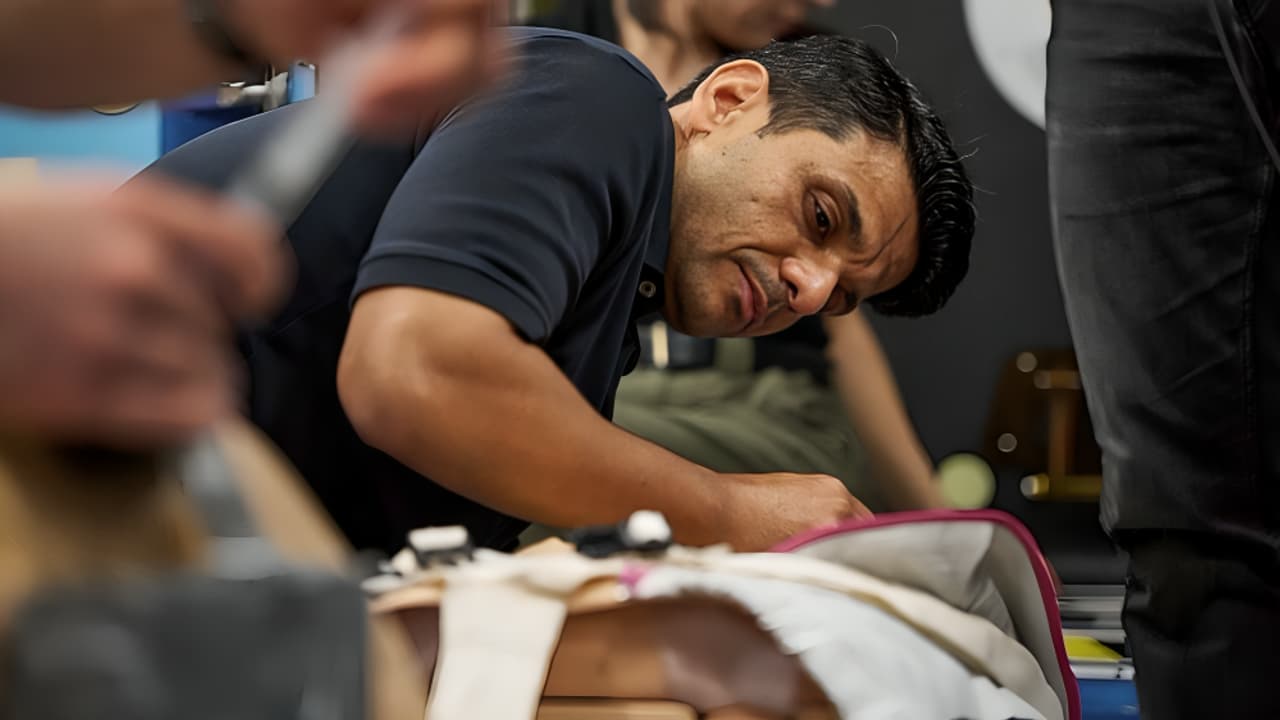Science
Astronaut Shubhanshu Shukla Demonstrates CPR Techniques in Space

Group Captain Shubhanshu Shukla, who recently became India’s first astronaut to visit the International Space Station (ISS) as part of the Axiom-4 mission, has captivated audiences with a video demonstrating how cardiopulmonary resuscitation (CPR) is performed in zero gravity. Published on social media on September 22, 2025, the clip highlights the unique challenges of providing medical care in space, where traditional methods cannot be directly applied.
Shukla emphasized that medical emergencies in space present a situation unlike any on Earth. “Once you’re up there, help is not coming, so you have to rehearse nonstop,” he stated. Astronauts are trained to act as medical personnel, taking on roles similar to doctors and nurses, as they prepare for various medical scenarios. In their training, they practice CPR using mannequins, mouth-to-mouth resuscitation techniques, and the operation of an Automated External Defibrillator (AED) to restore a heartbeat.
Challenges of CPR in Weightlessness
The astronaut highlighted that performing CPR in a zero-gravity environment is akin to doing a “zero-gravity upside-down wall push-up.” On Earth, CPR typically consists of pressing down on a patient’s chest. In contrast, both the rescuer and the patient float in space, making effective chest compressions nearly impossible.
To adapt to this, astronauts must employ a unique technique. They flip upside down, anchoring their feet against the ceiling of the ISS, and then push off with their legs while administering chest compressions. This innovative approach allows them to exert the necessary force to perform CPR effectively in weightlessness.
Shukla’s engaging video quickly gained traction, with many applauding his ability to explain complex operations in an understandable manner. One user remarked, “Shuks is at it! This is how you educate the public and get people excited about space.” Another follower described the thread as “one of the best” they had encountered recently, showcasing the broad interest generated by his insights.
Inspiring Future Generations
Shukla’s efforts to educate the public extend beyond entertainment; they serve to inspire the next generation of space enthusiasts. His explanations provide valuable insights into the rigorous training that astronauts undergo and the realities of life aboard the ISS.
Before embarking on his three-week mission, Shukla underwent extensive training designed to prepare him for various emergencies. His experiences and demonstrations are expected to play a critical role in the Indian Space Research Organisation’s (ISRO) forthcoming Gaganyaan programme, which aims to launch India’s first manned space mission. By sharing practical lessons learned in real-time, Shukla is aiding ISRO in preparing future astronauts for potential emergencies they may face in space.
The demonstration of CPR techniques in a zero-gravity environment underscores the necessity for astronauts to innovate in addressing life-threatening situations without immediate medical assistance. Through his social media presence, Shubhanshu Shukla not only educates the public but also contributes to India’s readiness for upcoming space missions.
-

 World4 months ago
World4 months agoSBI Announces QIP Floor Price at ₹811.05 Per Share
-

 Lifestyle4 months ago
Lifestyle4 months agoCept Unveils ₹3.1 Crore Urban Mobility Plan for Sustainable Growth
-

 Science3 months ago
Science3 months agoNew Blood Group Discovered in South Indian Woman at Rotary Centre
-

 World4 months ago
World4 months agoTorrential Rains Cause Flash Flooding in New York and New Jersey
-

 Sports3 months ago
Sports3 months agoBroad Advocates for Bowling Change Ahead of Final Test Against India
-

 Top Stories4 months ago
Top Stories4 months agoKonkani Cultural Organisation to Host Pearl Jubilee in Abu Dhabi
-

 Science4 months ago
Science4 months agoNothing Headphone 1 Review: A Bold Contender in Audio Design
-

 Top Stories4 months ago
Top Stories4 months agoAir India Crash Investigation Highlights Boeing Fuel Switch Concerns
-

 Sports3 months ago
Sports3 months agoCristian Totti Retires at 19: Pressure of Fame Takes Toll
-

 Business4 months ago
Business4 months agoIndian Stock Market Rebounds: Sensex and Nifty Rise After Four-Day Decline
-

 Politics4 months ago
Politics4 months agoAbandoned Doberman Finds New Home After Journey to Prague
-

 Top Stories4 months ago
Top Stories4 months agoPatna Bank Manager Abhishek Varun Found Dead in Well









